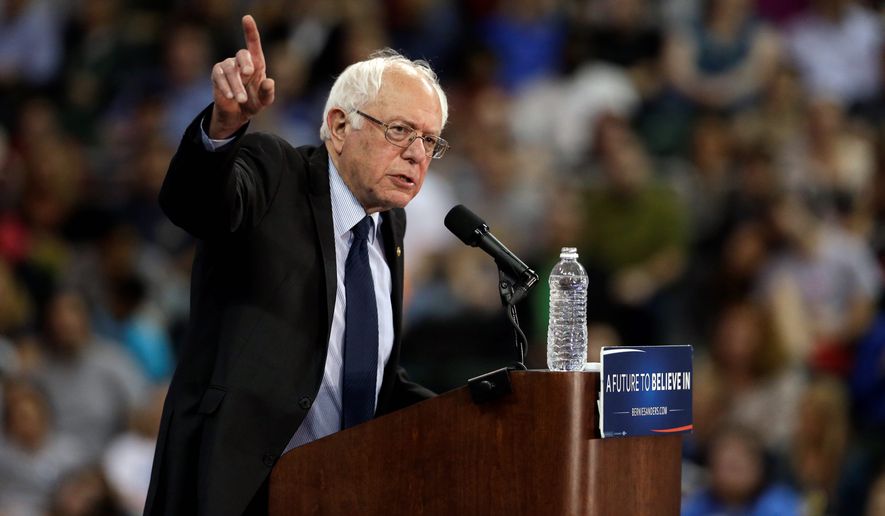With Hillary Clinton poised to capture the Democratic presidential nomination, political analysts and party insiders say her success is as much about the flaws and limited appeal of her opponent, Sen. Bernard Sanders, as it is about her own evolution as a candidate.
Mr. Sanders undoubtedly has had a major impact on Mrs. Clinton and the party as a whole, bringing Wall Street reform and income inequality to the fore as central issues.
But that message, while popular with young people and white working-class voters, has failed to resonate with minority voters and older Americans, and that fundamental flaw with the candidacy of the senator from Vermont has been exposed over the past several weeks in primaries in the South and Midwest.
In fact, some Democrats say they never expected Mr. Sanders to truly challenge for the nomination and have considered him more of a message candidate from Day One — a political phenomenon who could draw huge crowds and excite progressives, but lacking the staying power or long-standing political support across the country to truly compete with Mrs. Clinton.
In the end, political observers say, they are not at all surprised that Mrs. Clinton’s vaunted “Southern firewall” has held strong and looks like it ultimately will be the key to her victory.
Mr. Sanders “obviously is tapping into some real frustrations within the progressive wing of the base but I never thought he could play well with the African-American community or the Hispanic community,” said Clinton supporter Jim Manley, director of the communications practice at QGA Public Affairs and former spokesman for Senate Minority Leader Harry Reid, Nevada Democrat.
“I never could figure out how a message of railing against the millionaires and billionaires and special interests was going to resonate with the African-American community down South,” Mr. Manley said. “The fact of the matter is, it’s not right or wrong, but during his time in the Senate he never really played to the diverse communities across the country. He was something of a single-issue senator.”
Mrs. Clinton also has dismissed Mr. Sanders as a “single-issue candidate” who is comfortable talking only about income inequality and Wall Street reform.
Mr. Sanders, an avowed democratic socialist, has dismissed that characterization and has pointed to the fact that Mrs. Clinton increasingly is co-opting his anti-Wall Street platform.
Despite increasingly harsh attacks from Mr. Sanders, the former secretary of state remains far ahead in the delegate race and swept all five primaries last week, dealing a mathematical and psychological blow to the Sanders campaign with big wins in Ohio, North Carolina, Missouri and elsewhere. Mrs. Clinton now has 1,614 delegates to Mr. Sanders’ 856.
The figures include “superdelegates,” or party leaders free to support whomever candidate they choose. It takes 2,383 delegates to win the Democratic nomination, and while Mr. Sanders should do well in upcoming states such as Arizona, Washington, California and elsewhere, he will need to rack up huge margins of victory to make real gains on Mrs. Clinton in the delegate race.
While Mr. Sanders remains outwardly optimistic, analysts say the senator’s campaign surely knew it would have a difficult, if not impossible, time competing with Mrs. Clinton for the black vote in Southern states. The Democratic Party awards delegates proportionally, meaning big wins in Southern states — such as Mrs. Clinton’s 83 percent to 16 percent victory in Mississippi this month — have been the key to her delegate lead.
Mrs. Clinton’s ties with black leaders across the South go back decades, and even those who abandoned her in favor of Barack Obama in 2008 were sure to choose her this time, said Dave Woodard, a pollster and political science professor at Clemson University.
“There was never a breakup with Hillary,” Mr. Woodard said. “They knew what they were talking about. They knew they had a firewall down here.”
Mr. Sanders conceded Sunday that he was “creamed” in the Deep South, but he said he still has a shot to rebound.
“We think that the path forward is a pretty good path for us,” the senator said Sunday on CBS’ “Face the Nation.”
Mr. Sanders has done slightly better with black voters in states such as Michigan, exit polls show, though he continues to perform better in states with smaller minority populations.
Beyond the limited appeal of Mr. Sanders’ core message, analysts say, other factors have led to the looming Clinton victory. In some ways, they say, Mrs. Clinton is better positioned now than she was in 2008 because many Democratic voters want the next president to continue on the course charted by Mr. Obama, and the former secretary of state has made clear she will continue and expand many of the president’s signature policies.
Democrats’ anger over Mrs. Clinton’s vote in favor of the Iraq War, a central issue in the 2008 primary, seems to have dissipated over the past eight years, and foreign policy has been a strength for the former first lady during her debates with Mr. Sanders.
Still, there can be no doubt Mr. Sanders has pulled Mrs. Clinton to the left and has helped shape the primary race, said Matthew Dallek, an assistant professor of political management at George Washington University.
“He’s had a real impact on Hillary Clinton’s campaign. Sanders clearly has tapped into a lot of anger on the left at a variety of ills in the country,” Mr. Dallek said. “Sanders has substantive proposals that I don’t think have a chance of being enacted if he gets elected, but they’re substantive proposals.”
• Tom Howell Jr. contributed to this report.
• Ben Wolfgang can be reached at bwolfgang@washingtontimes.com.




Please read our comment policy before commenting.